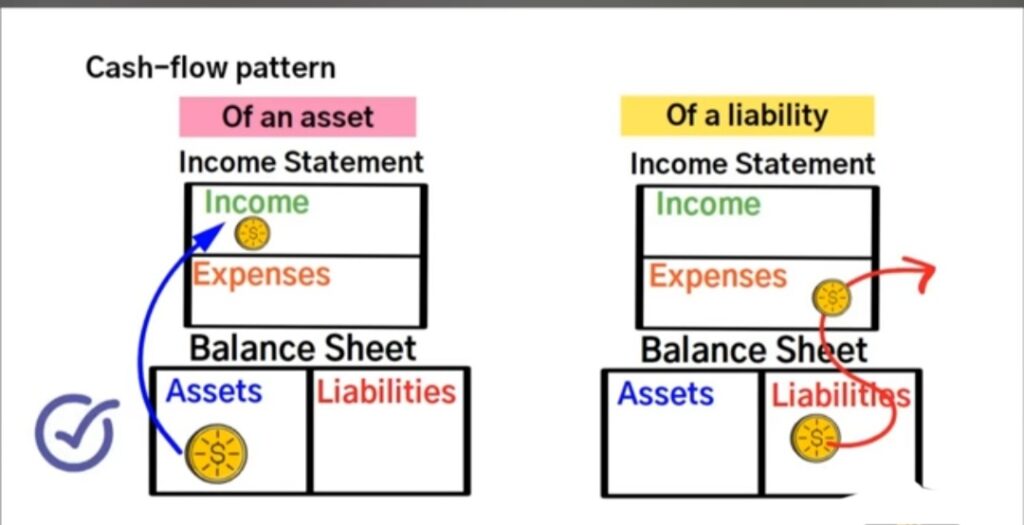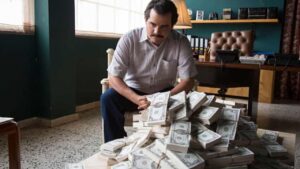Robert Kiyosaki, the author of the book Rich Dad Poor Dad, says that earning money is a science that is not taught in schools.
Schools teach us how to become an employee and build a career.
If you are coming from a middle-class family like I do, then there’s a high probability that your parents taught you how to become poor.
This is not because your parents don’t love you or don’t want you to be successful; it’s simply because they themselves are not educated on this topic.
They consumed expired information, and when you were born, they passed it on to you.
Kiyosaki says poverty is like genetics; it passes on from one generation to another.
Rich Dad Poor Dad is one of those finance books that I wish I had read when I was 14 or 15 years old.
I strongly recommend reading the book or read this blog post because I will be doing a detailed summary of all seven key lessons.
1. The rich don’t work for money.
When he was nine years old, Robert and his childhood friend Mike weren’t invited to a classmate’s beach house because they were poor kids.
Robert came home and asked his dad how to become rich, and the only response he got was, “You have to learn how to make more money.”
Even as a kid, Robert understood that this advice wasn’t going to help him become rich.
Robert’s father, whom Robert calls his “Poor Dad,” was a teacher and made a good living but always struggled financially.
Seeing how determined Robert and his friend Mike were to learn about making more money, Robert’s dad, the Poor Dad, advised them to go and talk to Mike’s dad, whom Robert called his “Rich Dad.”
Both Robert and Mike were quite surprised because Rich Dad wasn’t rich yet; plus, he never finished eighth grade but ran multiple successful businesses. Nevertheless, they went to meet Mike’s dad.
On the day of the meeting, he asked them if they were ready to learn how to make money.
They were excited and nodded their heads quickly.
He then made them an offer: he said that he would teach them how to make money, but not in a classroom style.
He would only teach them if they worked for him.
According to him, he would be wasting his time if they just wanted to sit and listen as they did in school.
They could learn faster if they worked for him.
Robert wanted to ask a question, but he didn’t give them a chance.
He said if they couldn’t make up their mind decisively, then they would never learn to make money.
Opportunities come and go, and being able to know when to make quick decisions is an important skill.
They knew they had to make a decision.
Robert and Mike looked at each other and both agreed to take the offer.
Mike’s dad was pleased and said he would pay them 10 cents an hour, and they would work three hours every Saturday.
Even though Robert had a softball game that day, he chose to work and learn instead of playing. He knew this was his opportunity, and he didn’t want to waste it.
So, Robert and Mike started working for Mrs. Martin, who was an employee of Mike’s dad and used to take care of a small supermarket.
They were the kind of stores where people bought essentials like milk, bread, butter, and cigarettes.
The only problem was that the stores didn’t have air conditioning, so they had to keep the doors wide open to the road and parking lot, which meant that dust would swirl and settle inside every time a car drove by.
Their job was to take canned goods off the shelves, brush them with a feather duster to get the dust off, and then restack them neatly.
It was mind-numbingly boring work.
They worked for three hours every Saturday and got paid 30 cents, which was not very exciting for them since one comic book cost 10 cents back then.
They did it because they wanted to learn how to make money, but after three weeks of doing this, Robert was ready to quit.
He felt like a slave working for just 10 cents an hour and hadn’t even seen Mike’s dad since the first meeting.
So at lunchtime on the fourth week, he told Mike that he was quitting. School was boring enough, and he didn’t want to waste his Saturdays doing this job anymore. He was done.
To his surprise, Mike started smiling and said that his dad had expected this to happen. He had told Mike to meet with him when Robert was ready to quit.
It made Robert mad, but Mike said that his father’s way of teaching was different from Robert’s parents.
He didn’t like to lecture and used experience as a way of teaching.
Robert agreed to meet with Mike’s dad the following Saturday to hear him out. Even his real dad was angry with Mike’s dad.
Robert’s Poor Dad had advised him to demand a raise of at least 25 cents an hour and to quit if he didn’t get it.
When Robert arrived at Mike’s house, he was made to wait in line for 45 minutes before Mike’s dad finally appeared.
Frustrated and angry, Robert told Mike’s dad that he had not kept his end of the bargain.
He had promised to teach him if he worked for him, but he had not fulfilled his promise.
Robert accused him of being greedy and not respecting his employees.
He asked Robert if teaching meant talking or giving a lecture, and Robert replied with a nod.
Rich Dad told him that life is the best teacher of all and that most of the time, life does not talk to you.
He explained that life often pushes us around to teach us something.
Some people let life push them around, while others fight back against the wrong things such as their job, boss, or spouse. But only a few people welcome life’s push as an opportunity to learn and grow.
Rich Dad said that he had over 150 employees, but none of them had ever asked him to teach them about money.
They only sought jobs and paychecks, never really grasping the purpose of their work.
However, when Mike told him that both of them wanted to learn how to make money, Rich Dad decided to create a program that mirrored real-life experiences.
He paid them a mere 10 cents an hour, which initially made them angry, but he explained that he wanted them to experience life’s push so that they could understand what he was trying to teach.
When Rich Dad asked Robert what he had learned from working for such a low wage, he complained about his greed and lack of respect for his workers.
He even threatened to quit if his Rich Dad didn’t pay him more or teach him more.
Rich Dad explained that most people would do exactly what he was suggesting: quit and look for a higher-paying job.
However, this usually wouldn’t solve their problems.
He wanted Robert to understand that waiting for a raise, thinking that more money would solve his problems, was not the solution. The solution is to make money work for you.
Robert was slowly starting to understand the lesson Rich Dad was trying to teach.
Rich Dad asked if Robert still had a passion to learn. When Robert said yes, he told him he was going to stop paying him for the work at the store.
Robert was confused. He came for a raise, but now he was going to work for free.
Rich Dad said that if he wanted to make more money, then he needed to use his head and figure it out.
Robert and Mike worked for free for three weeks.
One day, Mike’s dad showed up and took the boy outside for ice cream. Rich Dad asked if they had learned anything yet. They said no.
Rich Dad told them they’d better hurry and start thinking about the lesson that was staring at them.
To explain the lesson, he asked the boys to look at Mrs. Martin and the people in the park and think if the life they were living seemed exciting to them.
They worked hard for little money their whole lives, clinging to the illusion of job security and looking forward to a three-week vacation each year and maybe a pension after 45 years of service.
Rich Dad said if this kind of life excited them, he would be willing to offer them a raise of 25 cents an hour.
Their heartbeats raised, and they knew it would mean so much to them, but still, they said no.
Seeing their resistance, Rich Dad raised his offer to one dollar an hour, then two dollars.
Each time he raised his offer, Robert’s heart started exploding, and his brain was pushing him to take the offer.
He knew two dollars an hour would have made him the richest kid in the world.
He couldn’t imagine earning that kind of money.
He wanted to say yes; he could picture a new bicycle, a new baseball glove, and the adoration of his friends when he flashed some cash, but somehow, his mouth stayed shut.
Rich Dad was looking at the two boys staring back at him, eyes wide open and brains empty.
He was testing them, and he knew there was a part of their emotions that wanted to take the deal.
He understood that every person has a weak and needy part of their soul that can be bought, and he knew that every individual also had a part of their soul that was resilient and could never be bought.
It was only a question of which one was stronger.
So, he made a final offer of five dollars an hour. Suddenly, the boys’ expressions changed, and their empty looks changed into calmness.
They felt their temptation disappear in a second.
They felt the part of their soul that was weak and needy was silenced and taken over by the part that had no price.
Rich Dad said it was good they didn’t have a price; most people did because their lives were controlled by fear and greed.
Fear of being without money makes them work hard and earn a paycheck, but once they have that money, greed gets them thinking about all the things they could buy, which makes them need more money, which makes them spend more and work more.
=It’s what Rich Dad called the rat race=
Mike asked if there was another way, and Rich Dad said there was, but not many people knew about it.
Mike wanted to know what it was, and Rich Dad said they would learn it while working with him for no pay.
Mike asked for a hint, and Rich Dad replied that the first step is….
To tell the truth.
When asked what truth, he replied that it was about how they feel, and they must confess it to themselves, not others.
Rich Dad expressed doubt that the people working for him were capable of confessing their truth.
Instead, they feel the fear of not having money and respond emotionally rather than logically.
They do not confront their fear, and their emotions control their brains.
They work to earn money, hoping it will relieve their fear, but it never does.
Money governs their emotions and souls, and they refuse to acknowledge this truth.
Rich Dad urged them to avoid this trap, stating that being rich does not solve the problem.
When asked why, he introduced the other key emotion:
desire.
It’s common for people to desire things that are better, prettier, or more exciting.
They often work for money because they think it will make them happy, but the happiness from money is short-lived.
Many rich people are actually driven by fear, thinking that money will make them feel secure.
However, they end up fearing losing it all, which makes them more anxious than when they were poor.
Emotions often control our thinking, and fear can lead us to make decisions that don’t solve the real problem.
For example, when someone is afraid of not having enough money, they might think getting a job is the only solution. But in reality, a job is only a temporary fix for a long-term problem.
It’s important to learn how to think for ourselves and not let our emotions control us.
Rich Dad said that he saw hope when both of the boys agreed to work for free, and they also took the first step when they resisted their emotions when Rich Dad tempted them with more money.
They were learning to think in spite of being emotionally charged.
He told them to keep working, and the sooner they forget about needing a paycheck, the easier their adult life would be.
He encouraged them to keep using their brains, work for free, and soon their minds would show them ways of making money far beyond what he could ever pay them.
They would be able to see things that others couldn’t.
The moment they saw one opportunity, they would see them for the rest of their lives.
The boys did as Rich Dad advised, and pretty soon they saw an opportunity in creating a library where kids could pay an admission fee and read as many comic books as they wanted.
They hired Mike’s younger sister to be the head librarian.
She charged each child 10 cents for admission to the library.
It was a bargain for the kids since a comic book cost 10 cents each, and they could read five or six in two hours.
Mike and Robert averaged $9.50 per week over a three-month period.
They paid his sister one dollar a week and allowed her to read the comics for free.
They had to close the library after three months because of a fight that took place there, but they had already learned how to make money work for them even when they weren’t physically present.
They had learned the first lesson, which was “THE RICH DON’T WORK FOR MONEY”.
They were ready to learn more, and Mike’s dad was ready to teach them.
2. Why teach financial literacy?
When people ask Robert where he started getting rich, he gives them the same answer his Rich Dad gave him.
“If you want to be rich, you need to be financially literate”
For example, accounting is a subject that is boring and confusing but absolutely crucial to financial success.
To make it easy, Rich Dad used pictures and simple language to teach it to the two boys.
One of the first things Rich Dad explained to Robert and Mike was the difference between an asset and a liability.
He said that if you want to be rich, the only thing you need to do is buy assets.
That’s all you need to know to get rich. But despite it being so simple, it’s something that many people don’t understand.
When Rich Dad first explained it to Robert and Mike, they thought he was joking because the concept was so simple.
How could adults not understand this? Shouldn’t everyone be rich?
The problem is that most people have been educated differently by bankers, financial planners, and others, so they must unlearn what they think they know, and because of that, they buy liabilities thinking that they are assets.
Robert uses simple definitions for assets and liabilities.
An asset is something that puts money in your pocket, and a liability is something that takes money out of your pocket.
The cash flow pattern of an asset is straightforward.

The top part of the diagram is an income statement, often called a profit and loss statement, which measures income and expenses—money in and money out.
The lower part of the diagram is a balance sheet, called that because it’s supposed to balance assets against liabilities.
Assets add to your income; they put money in your pocket.
For example, if you have a house and you rent it out, then it’s an asset because it puts money in your pocket every month.
Conversely, a liability takes money out of your pocket.
If you want to be rich, you need to avoid liabilities and instead buy more assets.
Through these simplified diagrams, you can easily tell how each person handles money.
Robert says often those in debt think the answer to their problem is to make more money.
However, not only will more money not always solve their problems, it may compound them.
This is why many people who get a sudden windfall through the lottery or an inheritance quickly burn through it.
An increase in cash only results in an increase in spending.
What is missing for so many people is financial education, which is why they might still end up successful in their professions but still struggle with money.
They may have learned how to make money but not how to manage it.
People can be very intelligent and still be illiterate when it comes to finances.
They learned how to work hard for money but not how to make their money work hard for them.
Many people still believe that their home is an asset, but Robert teaches that a home is a liability because it takes money out of your pocket through taxes and other expenses.
This doesn’t mean you can’t ever buy a house; you can, of course, but make sure to first buy assets that will generate the cash flow to pay for the house.
Robert says if you want to get rich, all you need to do is buy more income-producing assets, keep your liabilities and expenses low, and when will you know that you already have enough wealth.
Robert uses the following definition for wealth:
wealth is a person’s ability to survive so many days forward, or if I stopped working today, how long could I survive?
Another way of stating it, wealth is the measure of the cash flow from the asset column compared with the expense column.
When your assets generate enough income to cover your expenses, you are wealthy, even if you are not yet rich.
3. mind your own business.
A friend of Robert heard Ray Kroc, the founder of McDonald’s, speak at the University of Texas in 1974.
Afterward, Ray agreed to join the students at their favorite hangout for a few beers.
He asked the students what business he was in. At first, they laughed, and then they answered that he was in the business of selling hamburgers, of course.
Ray told them he was not in the hamburger business but in the real estate business.
He knew that the land and location of each franchise were the most significant factors in its success.
Today, McDonald’s is the largest single owner of real estate in the world, owning some of the most valuable intersections and street corners around the globe.
There’s a big difference between your profession and your business. Often, Robert asks people, “What’s your business?” and they say, “Oh, I’m a banker.”
Then he asks them if they own the bank, and they usually respond, “No, I work there.”
In that instance, they have confused their profession with their business.
Their profession may be a banker, but they still need their own business.
Many people work for everyone else: their employer, the government (through taxes), and the bank (through a mortgage).
What Ray Kroc and Rich Dad knew was secret number three of the rich: mind your own business.
Don’t spend your whole life working for someone else.
Too many people spend their lives minding someone else’s business and making them rich.
Minding your business doesn’t mean starting a company, though for some people, it will.
Instead, your business revolves around your asset column, not your income column.
Keep your daytime job but start buying real assets, not liabilities that lose value as soon as you walk out of the store.
Keep expenses low, reduce liabilities, and diligently build a base of solid assets.
Parents need to teach young people this before they leave home so that they understand what a true asset is and won’t find themselves trapped in a lifestyle of debt.
Robert says real assets fall into the following categories:
- businesses that do not require his presence (he owns them but they are managed and run by other people; if he has to work there, it’s not a business, it becomes his job);
- stocks;
- bonds;
- income-generating real estate;
- royalties from intellectual property such as music and patents;
- and anything else that has value, produces income, or appreciates and has a ready market.
Acquire assets that you love. Robert loves real estate and thus spends most of his time thinking about and shopping for it.
If you don’t like real estate, don’t invest in it. Even while working for Xerox, Robert minded his own business.
He kept his day job and slowly built his asset column.
The more he understood accounting and cash management, the better he was at analyzing investments and eventually building his own company.
He doesn’t recommend people start a company unless they really have the desire to; otherwise, he advises them to keep their day job and mind their business, building and keeping their asset column strong.
As cash flow grows, you can indulge in luxuries, but only if the cash flow supports them.
Build the asset column and let the income generated by those assets pay for the luxuries.
When assets generate enough income to cover luxuries, that’s when you can buy them.
4. the history of taxes and the power of corporations.
Many people see Robin Hood as a hero, taking from the rich and giving to the poor.
Rich Dad did not share that opinion; he called Robin Hood a crook.
Though the popular sentiment is that the rich should pay more in taxes and give to the poor, in reality, it’s the middle class that is heavily taxed, especially the educated upper-income middle class.
To understand how this happens, Robert gives a brief history of taxes.
In England and America Originally, there were no taxes, only occasional temporary levies to pay for such things as wars.
In 1874, England made income tax a permanent levy on its citizens, and in 1913, America made an income tax permanent.
These countries were able to get taxes accepted by the majority because they were first levied only against the rich.
However, although income tax was designed to punish the rich, it ended up punishing those who had voted for it: the poor and middle class.
Rich Dad explained that he and Poor Dad were opposite.
Poor Dad, as a government employee, was rewarded if he spent money and hired people, making his organization larger.
But for Rich Dad, the fewer people he hired and the less money he spent, the more he was respected by his investors.
Poor Dad sincerely believed the government should help people.
For Robert, it was a challenge to work for one of the biggest capitalists in town and go home to a prominent government leader.
It wasn’t easy to know which dad to believe, but over time, as Robert studied the history of taxes, he saw an interesting perspective.
As the government’s appetite for money grew, taxes soon needed to be levied on the middle class, and from there, it kept trickling down.
But the rich saw an opportunity because they don’t play by the same set of rules.
Corporations, which became popular in the days of sailing ships, offered a way around taxes.
Understanding the legal corporate structure gave the rich a steep advantage and allowed them to outsmart the intellectuals.
A corporation is simply a legal document that creates a legal entity—it’s not really a thing, not a factory or a group of people, but it offers a lower income tax rate than individuals have.
This is why most wealthy people on the planet don’t pay taxes or pay very little percentage of their income as taxes.
Attempts to punish the rich rarely work because the rich find ways to minimize their tax burden.
5. The rich invest money.
Our mind is the most important asset. If you train it right, millions can be made from a simple idea or an agreement.
If you increase your financial intelligence, you will start seeing things that others don’t—in other words, you’ll start inventing money.
For example, in the early 1990s, the economy in Arizona, USA, was terrible.
When most people were scared and warned about the economic crash, Robert and his wife Kim made a lot of money.
Robert gives an example of buying a house worth $75,000 for $20,000.
They had to put two grand down as a down payment, but they didn’t have it, so they asked a friend to lend them two grand for a $200 fee.
The friend agreed, and while the purchase was being processed, Robert ran an ad advertising the same $75,000 house for only $60,000 and required no down payment from the buyers.
As soon as the house was legally his, he sold it in minutes, and $40,000 was created almost out of nothing.
Total working time: five hours.
What this simplified example illustrates is how ideas can create hundreds of thousands of dollars if you improve your financial intelligence and see what others miss.
Robert says markets go up and down, and investments come and go.
The world is always handing you opportunities of a lifetime—you simply need to be able to see them.
The more you develop your financial intelligence, which takes time, the more opportunities will be offered to you.
There are many changes ahead in our world, and developing your financial IQ allows you to see that future of change through the lens of excitement, not dread.
You’ll see the opportunities and act on them, as opposed to those who allow their fear to keep them on the sideline watching others move boldly forward.
For example, land was wealth 300 years ago. Later, wealth was in factories and production.
Today, wealth is in information, but information flies around the world at the speed of light, and this process will be faster and more dramatic as time passes.
6. Work to learn; don’t work for money.
Robert was interviewed a few years ago in Singapore by a journalist who, over the course of their conversation, revealed that she wanted to become a best-selling author like him, but her novels, which everyone said were excellent, never sold.
Robert suggested that she take a course in sales training.
That offended the reporter, who said she had a master’s in English literature and didn’t see how learning to sell would help her—in fact, she hated salespeople.
When Robert pointed out that he was a best-selling author, not a best-writing author, she replied that she would never stoop so low and learn to sell and left the interview.
There are talented people all around us who struggle financially, just like that reporter. In the words of one business consultant, they are “one skill away from greatness.”
When it comes to money, the only skill most people know is to work hard.
If that reporter took some courses in sales, then got a job at an advertising agency, she would learn a lot about sales, and then she could use that knowledge to sell more novels.
When Robert came out with his first book, “If You Want to Be Rich and Happy, Don’t Go to School“, a publisher suggested he change the title to “The Economics of Education“, but Robert knew that such a title wouldn’t sell.
Even though he is pro-education, he chose a title that was controversial because he knew it would get him on more TV and radio shows, and it worked.
Rich Dad encouraged Robert to learn a little about a lot. That’s why Robert and his friend Mike had worked so many jobs growing up to gain a variety of experiences.
Most people work hard to get a secure job, focusing on pay and benefits in the short term. What they should do is seek work that will teach them the skills they’ll need.
Robert recommends a long-term view. Instead of simply working for money and security, take a second job to learn a second skill.
Many will resist this because they aren’t ready for change, but it’s like going to the gym—you might have to talk yourself into starting, but you’ll be so glad you did when the workout is over.
Poor Dad wanted Robert to become specialized, even though that didn’t work out well in his own life.
He never understood that the more specialized you become, the more you are trapped and dependent on that specialty.
Rich Dad, on the other hand, encouraged Mike and Robert to groom themselves and learn about a lot of different areas of business.
According to Robert, the main skills needed for success are:
- management of cash flow
- management of systems,
- And management of people.
The most important specialized skills are sales and marketing.
These are skills Robert works on constantly, attending courses or buying educational resources to expand his knowledge.
7. Overcoming obstacles.
The four main reasons financially literate people may still not develop abundant cash flow are:
- fear,
- cynicism,
- laziness and
- bad habits.
Let’s look at each of them.
Overcoming fear: No one likes to lose money. The only people who have never lost money investing are those who haven’t done it. Everyone has the fear of losing money.
The difference is how you handle fear and losing.
The primary difference between a rich person and a poor person is how they manage that fear.
Robert says, “I have never met a rich person who hasn’t lost money, but they don’t let the fear of that take them out of the game.”
Most people play not to lose when they need to be playing to win, and that’s why so many people struggle financially.
They might have a safe, sensible, and balanced portfolio, but it’s not a winning portfolio—they’re playing not to lose.
For example, a balanced portfolio isn’t a bad thing, but it’s not going to help you win big.
It’s not how successful investors play the game.
You must be a little unbalanced in the beginning and put your eggs in a few baskets and focus on them.
Overcoming cynicism, whether it’s our own self-doubt or the doubts of other people in our lives, often we allow that doubt to keep us from acting.
We play it safe, and opportunities pass us by.
Robert shares the example of a friend who was about to buy an investment property for a great price but backed out at the last minute when a neighbor who wasn’t an investor told him it was a bad deal.
Had he stayed in it, he would have doubled his investment and started to get out of the rat race.
Doubts and cynicism keep most people poor.
Rich Dad liked to say, “Cynics criticize, and winners analyze.”
Winners keep their eyes open and see opportunities everyone else missed.
For example, real estate is a powerful investment tool for anyone seeking financial independence, yet every time Robert mentions real estate as a vehicle, he often hears, “I don’t want to fix toilets,” or “I don’t want to deal with problematic tenants.”
They focus on toilets, and it keeps them poor.
Overcoming laziness—what’s the cure to laziness? A little greed.
That can be hard to hear because so many of us were raised to see greed or desire as a bad thing.
Rather than saying, “I can’t afford it,” change your mindset to, “How can I afford it?”
That opens the brain and forces it to think of solutions. “I can’t afford it” is a lie.
The human spirit knows it can do anything.
By saying you can’t do something, you’re creating a conflict between your spirit and your lazy mind.
“How can I afford it” creates a stronger mind and a dynamic spirit. Without that little greed, the desire to have something better wouldn’t be possible.
Our world progresses because we all desire a better life.
New inventions are made because we desire something better.
We go to school and study hard because we want something better. Too much greed is bad, but a little can motivate you.
Overcoming bad habits—to be successful, you must develop successful habits.
Poor Dad always paid everyone else first and himself last, but he rarely had any left over.
This was his habit. On the contrary, Rich Dad always paid himself first, even if he was short of money.
He knew that creditors and the government would complain if he didn’t pay them.
This motivated Rich Dad to seek other forms of income to pay them.
If he paid himself last, he wouldn’t feel that kind of productive pressure.
Forcing himself to think about how to come up with the extra income to pay the creditors made him stronger.
This is it for this blog post. I’ve summarized several other books, check out My Book Summary If you are interested. Thanks for reading.
if you found this article helpful, kindly share it with your loved ones. it encourage me to write more. And before You leave, check out the recommended reading below, am sure you will find something that will interest you. THANKS









